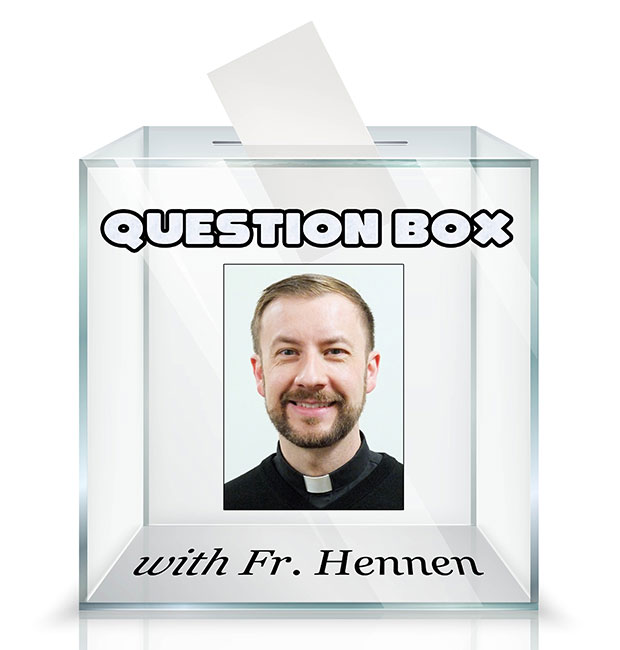 By Fr. Thom Hennen
By Fr. Thom Hennen
Question Box
Q: What acts of blessing are appropriate for lay Catholics to do? For example, should someone who is not a priest or deacon make the sign of the cross over someone?
A: First, it may be helpful to explain what a blessing is. In the most general sense, a blessing is a gift of God, the source of all good. Therefore, any blessing given by an ordained minister or prayed for by the laity is ultimately from God, not from the person giving the blessing.
A blessing is also a form of praise, as when we say, “Bless the Lord!” It is not that God needs our blessing — quite the opposite. What we are really saying is, “Praise God!” Even this is a gift from God. The fourth Common Preface of the Eucharistic Prayer puts it this way: “For, although you have no need of our praise, yet our thanksgiving is itself your gift, since our praises add nothing to your greatness but profit us for salvation.”
Understanding that all blessing comes from God, who then may give blessings? In the broadest sense, anybody. This is what is called an “invocative” blessing, asking or invoking God’s blessing upon a person, gathering, food, etc. When we consider that all of the baptized participate in the one priesthood of Jesus Christ (what we call the “common priesthood of the baptized”), this takes on even greater significance. Throughout the Bible, we have examples of people “blessing” others or “calling down” God’s blessing upon people and things.
Probably the most common example of this in our everyday life would be the blessing before meals. Look at the traditional Catholic formula for this: “Bless us, O Lord, and these thy gifts, which we are about to receive from thy bounty. Through Christ, our Lord. Amen.”
Notice in this prayer that we are asking God’s blessing upon us first and then the food that we are about to eat. This is no reflection on the cook or the quality of the food. Often when we are blessing something, we are really asking God’s blessing on the person who will use or receive that thing, be it water, a home, a church bell or fishing equipment. Yes, there is a special blessing in the Book of Blessings for fishing gear, but no guarantees it will make you catch more fish.
Another simple example of an invocative blessing that a lay person may give is the blessing of parents over their children, perhaps by praying with them before bed, making the sign of the cross on their forehead with the thumb (or using holy water) and saying something like, “May God bless you, protect you, keep you safe, and be always in your heart.” Even when someone sneezes, what do we say? “God bless you!”
Another kind of blessing, reserved to those who are ordained, is called a “constitutive” blessing. This is a setting apart (or “consecrating”) of something for special use. A constitutive blessing gives a sense of enduring sacred character, which is why we treat blessed things with the reverence that we do, so long as they are still usable.
A lay person may not make the sign of the cross as a deacon, priest or bishop might do over a person or object. I suppose they could but, in a sense, they are “shooting blanks.” In other words, there is something to that act or gesture that is reserved to those who are ordained. Of course, in the end God can bless whomever or whatever he wills.
(Father Thom Hennen serves as the pastor of Sacred Heart Cathedral in Davenport. Send questions to messenger@davenportdiocese.org)










